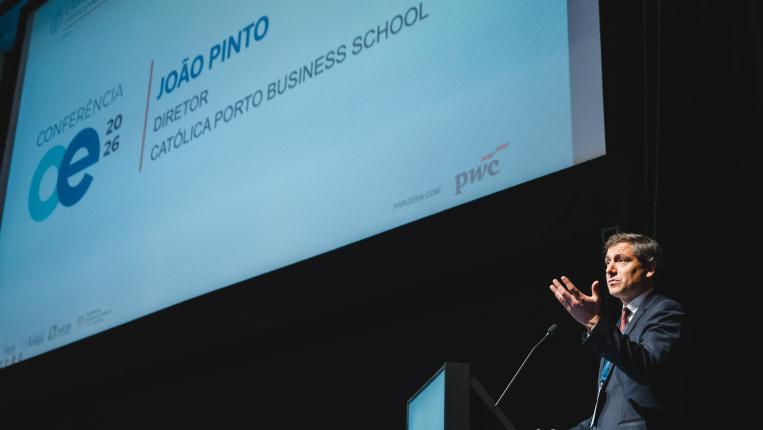Católica Porto Business School, in partnership with PwC, held another edition of its annual conference dedicated to the State Budget for 2026 (OE26), which has already established itself as a national reference in the discussion of major fiscal and economic issues. The event took place at the Ilídio Pinho Auditorium, at the Universidade Católica Portuguesa in Porto, and brought together representatives from government, business and academia.
The opening session was led by Isabel Braga da Cruz, Pro-Rector of Universidade Católica Portuguesa, who highlighted the consolidated role of this initiative:
“It is with great enthusiasm that the Universidade Católica Portuguesa in Porto welcomes you to the 15th edition of the State Budget Conference, an event that, since 2011, has become a reference in the national debate on major fiscal and economic issues”.
This was followed by an address from Cláudia Reis Duarte, Secretary of State for Tax Affairs, who presented the main guidelines of the 2026 State Budget proposal:
“The 2026 State Budget proposal looks to the future with ambition and responsibility. It builds on the path initiated by the previous budget, deepening our commitment to fiscal responsibility, public investment and the modernisation of the State’s financial management”, she stated.
The programme featured two discussion panels. The first, “OE26: A Driver for Economic Growth?”, explored the macroeconomic impact of the budget and included contributions from Gonçalo Regalado (CEO of Banco Português de Fomento), João Bento (CEO of CTT) and Vera Rodrigues (Head of People at Sonae MC), moderated by Luísa Anacoreta, professor and coordinator of the Double Degree in Law and Management at Católica Porto Business School.
The second panel focused on the most significant tax changes introduced by the 2026 State Budget and featured presentations by Cristina Pinto (professor at Católica Porto Business School) and Hugo Salgueirinho Maia (Tax Partner – Indirect Tax, PwC). The session was moderated by Maria Antónia Torres (Tax Partner – Deals Tax, PwC). Topics discussed included changes to Corporate Income Tax, Personal Income Tax, Property Transfer Tax and indirect taxes, as well as other measures announced but not included in the budget proposal.
The closing remarks were delivered by João Pinto, Dean of Católica Porto Business School, who underlined the importance of informed public debate on fiscal policy:
“OE26 cannot simply be an exercise in budgetary balance; it must, above all, serve as a lever for the future. It includes important measures, but most represent continuity and adjustment rather than structural transformation”.
He also thanked all participants and speakers, noting that:
“It is precisely the role of Católica Porto Business School to act as a meeting point between academia, business and public decision-makers, contributing to the building of a more competitive, fair and sustainable future.”
With around 400 participants, both in person and online, this conference once again reinforced the School’s mission of knowledge sharing and its strong connection between academia and the business world, while offering students from the areas of Finance, Economics, Management and Taxation the opportunity to deepen their understanding of highly relevant and current topics.











